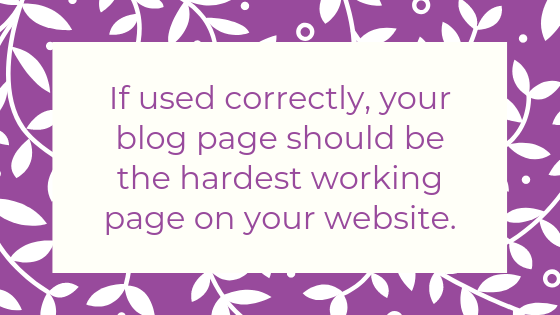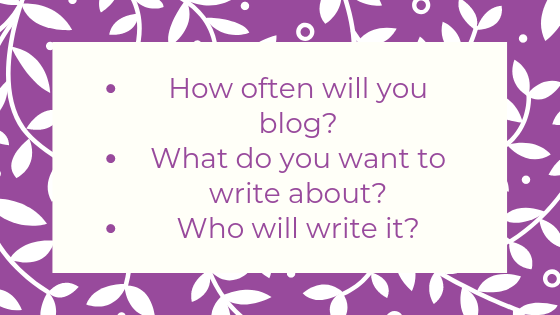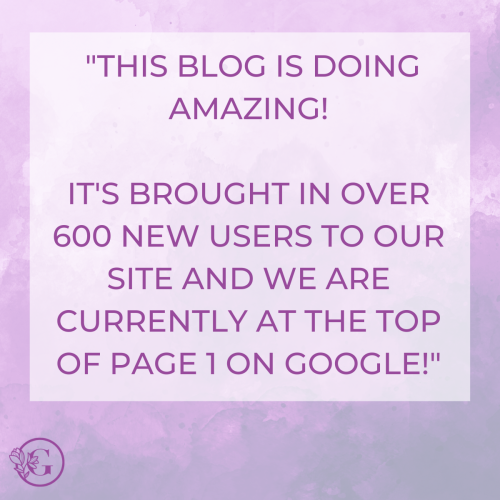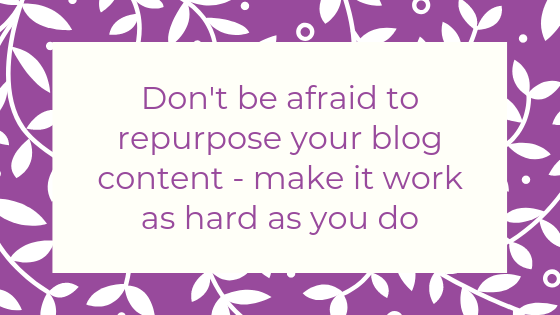Do you want a hard-working blog?
It should be no surprise that blogging has grown increasingly important for businesses looking to build relationships with their audiences.
No longer the hidden page on your website highlighting your latest corporate news, blogs are your self-publishing tool that will allow you to share your knowledge and expertise. They can demonstrate your brand personality and help you differentiate yourself from your competitors.

It should not only drive traffic directly to your website by referring to your specific services, but it should contribute a significant proportion of output on your social media channels.
It should also lead to an increase in referrals and conversions as readers are encouraged to contact you directly after reading your content.
Why your business should start blogging
According to Demand Metric (as reported by Hubspot), Companies with blogs produce an average of 67% more leads per month than companies that don’t have active blogs (Source: DemandMetric)
This is backed up by Constant Content who suggests that featuring a blog on your site will give you a 434% better chance of being ranked highly on search engines. Blogs can also increase the impact of your email marketing campaigns as well as provide timely, and relevant content to share across your social media platforms.
Do any of the other pages on your website work as hard as this?
How to make your corporate blog work hard
As an experienced blog copywriter, Amy has worked with many UK businesses to help them develop cohesive content marketing strategies that help them to make the most of their blogging potential. We’ve seen how great blogs can increase audience engagement, helping you to establish strong brand recognition and improved conversions and sales.
Here are just a few of our suggestions for how you can turn your blog into the hardest working page on your website.
Establish a dedicated blogging strategy
The most important thing of all is to establish a cohesive plan of action that will inform what you want to do, how you want to do it, and identify why you are doing it and what you want to achieve.
It can be easy to simply jump in and start writing, but without a solid plan of what you want to do, it’s almost impossible to be successful.

The first thing you need to do is to create a cohesive plan of action. You should decide how often you are going to blog, what you want to write about, and decide who will write the content. You may find that if you’re busy, that it’s a good idea to delegate the writing amongst different members of your team. Each employee may have a different opinion or perception, but they can come together and showcase your expertise effectively, without taking over from your daily tasks.
Once you know what you want to write, you need to decide how you want to write it. In other words, what is your tone of voice? Blogs have great flexibility to them; they can be written in an extremely chatty, friendly style but they can also be authoritative and corporate. You need to take a company decision to decide how you want your readers to view your articles and communicate that tone of voice with your writers.
Of course, one easy tip is to hire a blog copywriter like Amy Dawson, who is there to be your external copywriting support. Amy can advise on your blogging schedule, research your keywords and help you integrate your blog pages into your wider PR strategy.
Is your business blog doing what it sets out to do?
Over the years, we’ve read thousands of corporate blogs – some brilliant, some forgettable, and some unfortunately not particularly well written. When you write a corporate blog, you want your readers to understand its purpose – this comes back to the ‘why’ section of your blogging strategy.
What action do you want your reader to take after they’ve read your blog? The biggest mistake is allowing them to simply click away from your site without having done anything. You can use your article to direct readers to other pages (perhaps previous blog posts), or you could encourage them to pick up the phone and call you or email you. Or maybe you want them to subscribe to your mailing list.
If you have a clear call to action, you can use your analytics to determine if the blog has done what it set out to do.
It may be tempting to reach for the latest AI solutions to write your blog for you. But ChatGBT won’t take your audience into consideration. It won’t address what matters to your customers, or help you nurture that relationship from the very first interaction.
Is your blog copywriter optimising your search potential?
 You want to make sure that your blogs are found on Google. After all, why else are we putting the time and investment into writing the blog in the first place?
You want to make sure that your blogs are found on Google. After all, why else are we putting the time and investment into writing the blog in the first place?
Optimising the blog for SEO isn’t just about stuffing it with relevant keywords. There’s nothing worse than reading something that’s clearly been written for SEO algorithms rather than human customers.
It’s about working with an SEO copywriter (like Amy) who understands not just the keywords, but the search intent behind those search queries.
Your search intent is the reason why your customers are searching for a specific phrase or quiery.
- Do they want to learn and educate themselves?
- Are they trying to find out information about a specific item?
- Do they want to be inspired and excited?
- Are they might be searching for a product or service to purchase?
- Do they want to learn about you as a company?
- Are they trying to find a local product or company to work with?
By understanding that intent, the copywriting phase becomes much easier. It will almost certainly change the way that you write each article. If the search intent is “informational“, your blog will naturally go into deeper explanations and detail, whereas you can be more sales driven if the search intent is “commercial.”
The good news is that various tools such as SEMRush or SE Ranking make it much easier to identify the search intent and volume behind each search keyword.
From there, you can combine your original storytelling narrative with those data-driven insights to create a well-written blog which will be better found on Google.
Make your blog work hard – that’s what it’s there for
Once you’ve written your blog and published it onto your site, it can be easy to tick it off your ‘to-do’ list. But your blog isn’t going to find an audience if it’s sat static on your website.
You need to direct your audience to your blog and let them know that it’s there.
- If you send out regular email newsletters to your customer base, then make sure you include a link to your blog.
- Think about incorporating it into your email signatures – you’d be surprised how much it could impact your open rate.
- You should also make sure that it’s shared on your social media – where possible, you should encourage your staff to ‘like’ and ‘share’ your corporate content as well.
- We always recommend repeatedly sharing on social media – particularly on platforms such as LinkedIn where your audience will only see it if they happen to be online when it’s posted. Try sharing different posts at different times of the day; you may find that some days or times are better than others.
Are you repurposing your blog content?

For instance, you may wish to take soundbites from your blog (perhaps a quote or a statistic) and use it on your social media channels. If you don’t have an in-house design team, there are free online tools available (such as Canva) which can help you create easy to use graphics or imagery to support your blog post. You could even use an automated tool such as Lumen5 to convert your blog into a video post.
You should also continue to share previous blog content. If the article is still relevant (and doesn’t have any dated references) then there is no reason why you cannot re-share content that you published several months prior. It will demonstrate more content for your social media channels and continue to drive audiences to your website long after its original publication date.
Evergreen content is always valuable, especially if your content is written with an informational intent applied – just make sure that you continually review your content and update any outdated statistics or soundbites.
Why not hire a blog copywriter to manage this for you?
We understand that most companies would prefer to keep their blogging strategy in-house, after all, who knows your business and your sector better than you? But as other priorities come to the forefront, your well-intentioned blogging plans can easily be left behind. Before you know it, you may have an unloved and untouched blog page which runs the risk of you looking dated or even worse, as if you’ve stopped trading.
If you are considering finding a blog copywriter to manage your blogging strategy for you, it’s important to find the right match for your needs.
Your ideal blog copywriter should understand not only your business but your sector and your tone of voice.
They should be fully involved in your content strategy to help you maximise the efficiency of your blog and provide you with added value for money far beyond just the writing. For instance, you may wish to have a copywriter who can help identify new angles or topics for discussion. A great copywriter should also identify the correct keywords for your business, suggest appropriate subheadings and SEO tags or even suggest social media status updates for you in relation to the blog.
Ideally, they should be able to identify any newsworthy opportunities and spot where media relations could be used to ramp up the content and bring your news to external audiences.
You might even want your copywriter to identify when and where your blog idea should be expanded out into detailed research or white papers. You might be surprised to learn that an initial blog idea can be expanded into much stronger content ideas and research projects. Many of our thought-leadership projects initially began from an outline blog idea.
Hire Amy Dawson to be your blog copywriter
Amy Dawson is a blog copywriter specialising in blogging for UK businesses. She will always go that extra mile to make your blog work as hard as you do. If you would like to find out more about how she can support your blogging strategy, please book a call.

